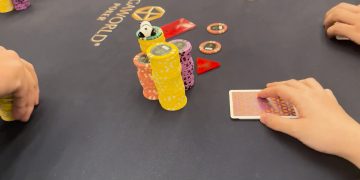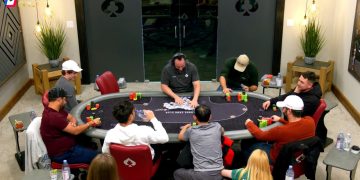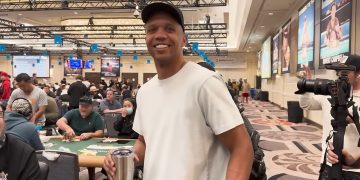If there is anything you take away from this article related to poker tips for a poker shootout tournament, it’s, “Patience early, aggression late.” More on that soon. First, let’s take a look at what exactly a poker shootout tournament is.
What Is A Poker Shootout Tournament?
A poker shootout type of tournament basically means that you have to win your table in order to advance to the next round. In some cases, when there is a 100-player limit, if you win your table, you make the final table. If you make the final table, you’re in the money.
However, most of the time, there is no player limit and you must win more than one table to make the money, let alone win the whole thing. What can be really frustrating is when you’re heads-up at your table and you lose. You might have already invested many hours in this event, but you will have nothing to show for it.
Then again, if you play in poker tournaments, then you know exactly what I’m talking about. Poker tournaments can certainly be more frustrating than other poker games.
These are usually Texas Hold’em poker tournaments. In fact, I have never seen a shootout tournament that is anything other than Texas Hold’em. I’m sure they exist. I just haven’t seen them. Keep in mind that other than Las Vegas and Choctaw, Oklahoma, I don’t play much on the west side of the country. It’s very possible there are Texas Hold’em poker tournaments with the shootout tournament format on the west side.
Shootout Tournament Strategy

As stated above, you want to be patient early and aggressive late. Those are poker rules for winning a shootout tournament.
You really need to treat each table as a Sit & Go, just at a higher level of play in most cases. I say in most cases because there are Sit & Gos with high buy-ins. Played in these before, and I can tell you there is a substantial difference between the players in the $100+ Sit & Gos and the $500+ Sit & Gos. I know those don’t sound like super high numbers for poker tournaments, but they’re definitely high for live Sit & Go tournaments.
I didn’t play in any of the high buy-in Sit & Go poker tournaments this summer, but I did last summer. The Russian dude to my right in one game had been at the World Series of Poker for five weeks and was up north of $50,000 by just playing in Sit & Go poker tournaments. That isn’t the guy I want at my table.
What was really memorable about this tournament, as well as unfortunate, is that we were down to three players and we had agreed to chop once down to two players. Knowing this information, I stayed out of the way. They went heads-up with the Russian guy having AJ vs. the third player’s A8. By some miracle, they ended up chopping the hand. I later came in third with nothing to show for it.
That is one of the very few bad beat stories I will ever tell. Fortunately for you, I didn’t go into detail. When someone tells me a bad beat story, I usually nod my head and say, “Wow.”
I have no idea what they’re saying. Once in a while, I’ll say, “That’s crazy.”
They will then say, “Why is that crazy? I said I checked.”
At that point, I need to think fast, and I usually say something along the lines of, “Yeah! I think that’s crazy.”
They then ask why, and I have to ask them to rewind the hand. Then I actually have to pay attention.
The lesson here, and one of the best poker tips you will ever read from me, is to never say, “That’s crazy” when someone is telling you a bad beat story. It might get you into trouble. Even worse, you might have to listen to the entire hand and pretend to be sympathetic while thinking of nothing but eating pepper steak at an Asian fusion restaurant. That’s what I think about when someone is telling me a bad beat story.
Where were we? Sit & Gos, right? Yes. If you have played in these, then you already know that there is no sense in being aggressive early. Even if you double-up early, those chips aren’t going to have a lot of value. You can’t win a Sit & Go early, but you can lose it. The same exact concept applies to a shootout tournament. You want to be very selective with your poker hands early. This follows our poker rules for winning.
The early part of a shootout tournament has little to do with your actual poker hands. It has everything to do with you learning your opponents. Unlike an MTT, you don’t have to worry about a table change. You’re going to be at the same table the entire time, hopefully until you win it.
This makes it imperative that you learn the physical tendencies and betting patterns or your opponents, especially the latter. When half the field is gone and you can open up a little, you will know how to exploit each opponent.
For example, the player in Seat 1 might always check/fold when he misses the flop. The player in Seat 4 might always re-raise when drawing to the nuts. Seat 8 might always bet very quickly when he’s bluffing.
In regards to that dude in Seat 8, this applies to many more poker players than him. Always look at your opponents as human beings before looking at them as poker players. If someone bets very quickly on a big pot, this means they didn’t take enough time to evaluate how many chips they can extract from you without you folding.
If they didn’t go through this calculation, then it’s unlikely they have a monster. It’s likely a bluff or a quick bet because they’re protecting a marginal hand and want to get it over with (the result). If it’s a marginal hand, that quick bet is like going to the dentist to get a tooth pulled. It might hurt, but they want the pain to be over instead of thinking about it.
As far as opening your range of opening poker hands, yes, this is important. At the same time, you’re going to need to eat your open-raises sometimes and live with it.
A Poker Conversation

This reminds me of a conversation I had with a professional poker player who was in Choctaw for the Circuit earlier this year. He told me how he just busted a tournament (he made the money) because he couldn’t get anything rolling. Said he had open-raised with AJ-off, AT-off, and KJ and had to eat them all based on the opponents who raised him.
He knew he was beat in each situation, and the raises against him were all jams due to sky-high blinds. Might have busted, but his story taught me something. He was fearless about raising pre-flop. This dude would raise with good (not great) hands without sweating it because he was simply playing the players. If he knew he was behind, he would fold. Nothing he could do about it. No emotion, which is good.
This also applies to a shootout tournament. When you’re short-handed and you think you’re ahead, you need to go for it. Get as many chips in the middle as possible. There is no reward for second or third place in a shootout tournament. You do what you can based on making the correct decision and you live with the results. You will sometimes get unlucky, but if you stick to this simple poker strategy, the wins should make up for all those losses.
Poker Exploitation
I mentioned above that you need to exploit your opponents. If that’s the case, then they’re aiming to exploit you as well. This is where you deploy your defensive weaponry (my favorite kind of weaponry). You send out smoke screens and distorted mirrors. In case you didn’t already know, I want to induce bluffs. I can get this to happen by sending out the incorrect signals.
For me, this might mean limping with AA one time, checking dark on the turn with the nuts, three-betting with 53-off from the big blind, or anything else that doesn’t fit my normal betting patterns. I will also send out fake physical tells.
For instance, I will sometimes put my left hand on my right arm when I have a strong hand. I will do this many times for hours. I will also show a losing bluff after my left hand had been below the table. Later in the tournament, when the blinds are higher, I will place my left hand under the table if I’m fortunate enough to have been dealt the nuts.
If anyone was paying careful attention to my physical actions, it’s going to backfire on them. This is why you don’t want to pay too much attention to physical tells. Then again, know your opponents. You can usually tell who is straightforward and who is clever.
If you don’t think like that, it’s cool. All you have to do when you’re short-handed in a shootout tournament is change your bet sizes. This pertains to pre-flop and every street thereafter. Don’t bet based on the strength of your hand. A good player will pick up on this in an instant. Mix up how quickly you act as well, and even though you’re speeding up, don’t play too fast.
Unexpected Poker Tips
The first poker tip is unorthodox, but it’s important. When the shootout tournament begins and everyone is relaxed, strike up a casual conversation with a few of the players at your table. Ask them about what they do for a living, if they have played there before, how long it took to get to the poker room, etc. All of this is misdirection. All you’re really trying to find out is if they play poker online.
We need to find this out because online poker players will have played a lot more shootout tournaments and Sit & Gos. Due to this, they’re much more likely to take risks. What I mean by that is they will call your ass!
Do you have any idea how valuable it would be to find out if your opponents are going to call your bluffs and marginal hands prior to getting to the stage of the tournament when it really matters? It’s incredibly valuable. And I can tell you with absolute certainty that an online poker player is much more likely to call you than a live poker player.
They are accustomed to a faster pace of play, where one decision doesn’t mean as much as it does to a live player. For us live poker players, every decision is critical because we see much fewer hands. Because of this, we tend to be more conservative.
If you can avoid a bad bluff, it could save your tournament. You must gather this intelligence early in the tournament. If you don’t, you’re much more likely to fail. This is psychological warfare. If you want to win, you need the intelligence. Don’t be shy. Initiate the conversation!
Another poker tip is something I came across by accident. I was watching a video with Fedor Holz because I wanted to know his opinion on strategy for a shootout tournament. He didn’t say much in regards to strategy for a shootout tournament because he was on break when heads-up in a shootout tournament. He didn’t want to give away information.
However, the interview went in a more generic direction for overall poker strategy. Fedor said, “I rarely gamble. I don’t take too many big risks. I’m surprised by how many people do this.”
One of the best players in the world is a tight player (who also exploits the right targets). I’ve said it before and I’ll say it again, you can play AGGRO if you want, but you won’t last in this world. If you want to stay around this game, then you better decrease the impact of variance by tightening up.
That said, you want to open up the deeper you get in a shootout tournament. Every single time you think you have even a slight edge, you need to apply pressure. That’s the only way you’re going to get there. You can’t play tight and wait for cards when you’re short-handed in a poker tournament and there’s no money for second, third, or fourth place. If you’re not into winner-take-all, then you should be playing in different poker games, not shootout tournaments.
Final Thoughts
If you’re going to play in a shootout tournament, play tight early, find out if your opponents are live or online players, learn your opponents’ patterns and exploit them as you approach the middle of the tournament, then open up your range as you get deeper. Apply pressure every single time you think you have an edge late in the tournament. Get all your chips if you can. That’s the only way you’re going to take it down. See you at the WSOP!
♠ pokerjournal.org
Shootout Strategy – FAQ
What is a shootout poker tournament?
A poker shootout tournament means you must win your table to advance to the next round of a tournament.
What is the best strategy for a shootout poker tournament?
I highly recommend a TAG strategy, but be extra patient early and accumulate chips when it's down to 3-4 players when other players are scared to get involved.


















Discussion about this post